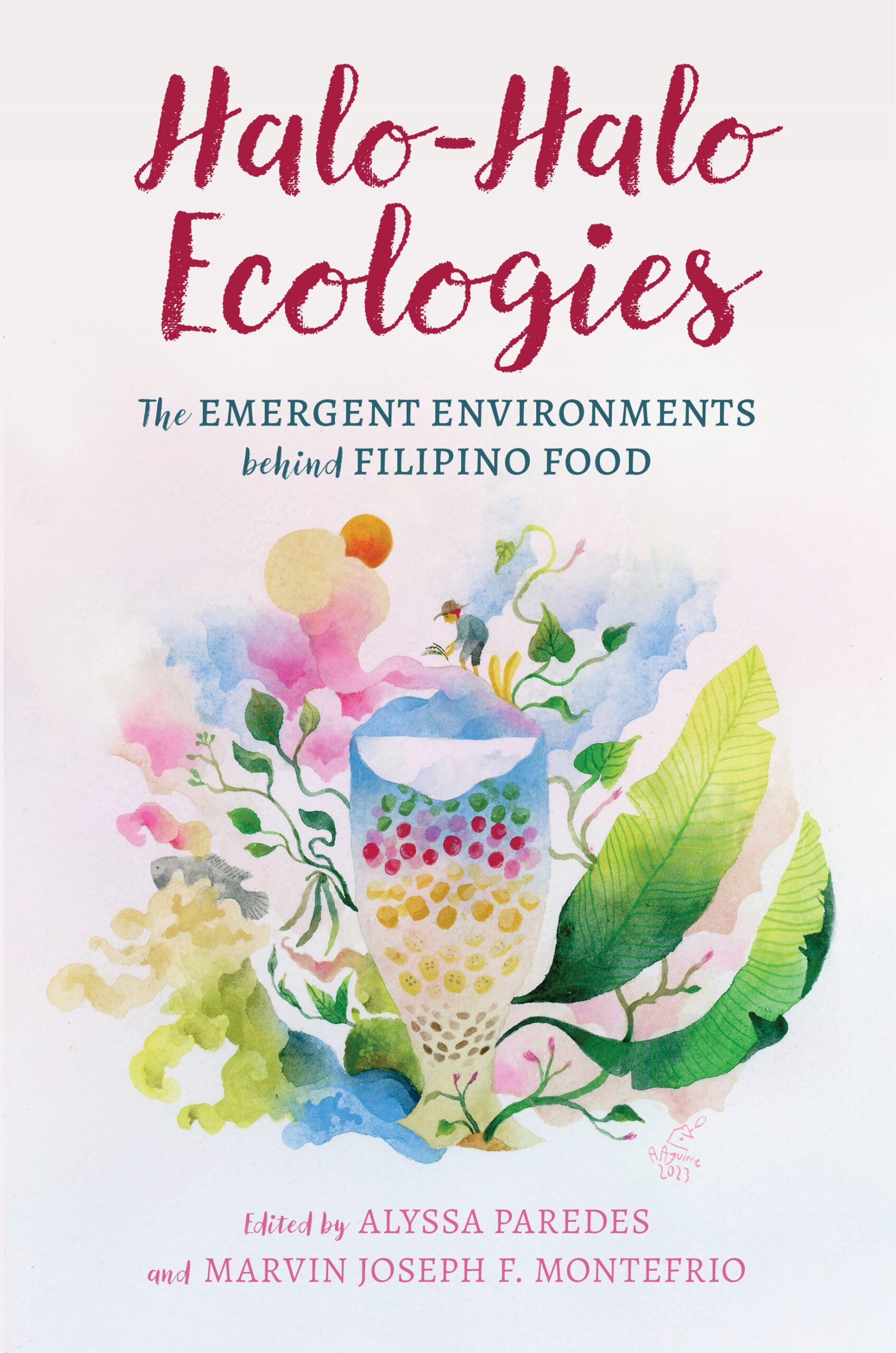Halo-Halo Ecologies: The Emergent Environments behind Filipino Food
- About the Book
-
Halo-Halo Ecologies: The Emergent Environments behind Filipino Food is a recipe for a new storytelling tradition that combines critical studies of Filipino food and of the environment. It takes as its starting point the metaphor of halo-halo, the iconic dessert of crushed ice, jellies, fruit slices, and ube jam. Food writers and social historians alike frequently describe this summertime treat as a symbol of Filipino cultural identity for the ways it mixes local and foreign ingredients into a concoction now readily recognized as typically “Pinoy.” But halo-halo is also a product of Philippine ecosystems—that is to say, it represents an eclectic blend of environmental tales in an ever evolving and highly politicized foodscape. The first of its kind, Halo-Halo Ecologies brings together a transnational community of food enthusiasts, engaged scholars, and social and environmental activists to set the table for a new canon in Philippine and Filipino/Filipinx studies, and in food studies more broadly. In twelve chapters, the contributors complicate cultural icons, like Jollibee Chickenjoy and the sari-sari store, and bring these into conversation with the scavenging practices of informal settlements in Manila and the agroecological practices of Indigenous Lumad schools. They reveal new challenges in landscapes spanning the mountainous frontiers of Northern Luzon, the carceral spaces of urban Manila; the disaster-prone coastal communities of the Visayas; the hunger-stricken plantation zones of Mindanao, the ever-changing tides of the archipelago’s waterways, and the invisibilized ecologies of the diaspora. These are the emergent environments behind Filipino food, and they compel us to reimagine what, how, and why we eat.
- About the Author(s)
-
Alyssa Paredes, Editor
Alyssa Paredes is assistant professor of anthropology at the University of Michigan.Marvin Joseph F. Montefrio, Editor
Marvin Joseph F. Montefrio is associate professor of social sciences (environmental studies) at Yale-NUS College in Singapore.
Contributors
- Anacorita O. Abasolo
- Inigo Acosta
- Maria Carinnes Alejandria
- Tami Alvarez
- Mary Jill Ira Banta
- Jose Kervin C.B. Calabias
- Dana M. Collins
- Adrian De Leon
- Katrina Beatrice David Jacinto
- Nicolo Paolo P. Ludovice
- Orven Mallari
- Anthony D. Medrano
- Marvin Joseph F. Montefrio
- Alyssa Paredes
- Cla Ruzol
- Joshua Ezekiel C. Sales
- Thea Kersti Tandog
- Jessie Varquez
- Reviews and Endorsements
-
- The painful irony of this book is that along with the pride over the internationalization of Filipino cuisine, one strongly felt in the diaspora, is the suffering of those back home as corporate greed, militarism, and the genetic modification of food continue the ecological devastation of their foodways. This intrepid group of scholars asks us to take a pause and consider the increasingly fraught histories behind our most cherished dishes.
—Patricio N. Abinales, University of Hawai‘i at Manoa - This is the most interesting book I have read about postcolonial and transnational gastroecology in terms of its empirical richness and theoretical provocation. Halo-Halo Ecologies’ critical juxtaposition of food and environment gets us around the cliches of mere ethnocentric gourmandism. It is a model for thinking through the complex history and experience of the world we consume (and destroy) to sustain ourselves
—Krishnendu Ray, author of The Migrant's Table and The Ethnic Restaurateur - This trailblazing book is framed, argued, and written in a compelling and extraordinarily accessible manner, making otherwise heavy to digest topics easy and appetizing to engage. A tour de force, it will proudly stand alongside classic books on Filipino culture and society.
—Saturnino M. Borras Jr., coauthor of Scholar-Activism and Land Struggles - As Filipino cuisine and culture continue to gain global attention, Halo-Halo Ecologies provides an essential new perspective. While conversations about Filipino cuisine in the diaspora tend to focus on food as a symbol of cultural identity, this book implores us to broaden our scope. It's a crucial reminder of how vulnerable our foodways are and how much our connection to the land matters.
—Bettina Makalintal, senior reporter at Eater.com
- The painful irony of this book is that along with the pride over the internationalization of Filipino cuisine, one strongly felt in the diaspora, is the suffering of those back home as corporate greed, militarism, and the genetic modification of food continue the ecological devastation of their foodways. This intrepid group of scholars asks us to take a pause and consider the increasingly fraught histories behind our most cherished dishes.





